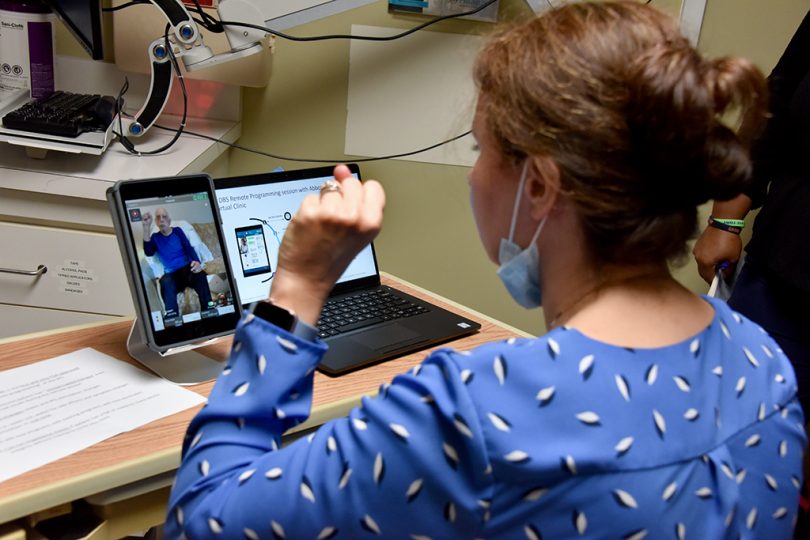During his routine neurology appointment on Aug. 30, Richard Martinez sat with his hands in his lap. They were uncontrollably, visibly shaking.
His neurologist, Dr. Julie Kurek, tapped a laptop screen a few times, adjusting the parameters on the battery in Martinez’s chest, which then adjusted an electrical current deep in his brain.
As Kurek watched, the tremors in Martinez’s hands visibly began to slow.
The remarkable part isn’t the treatment – Martinez, 79, has had deep brain stimulation therapy for nearly 20 years.
The remarkable part is that while Kurek sat in an exam room at AU Health in Augusta, Ga., Martinez sat in his home, on his couch, three hours away in Griffin, Ga.
AU Health is only medical center in the region to offer its patients this advanced technology.
The first of its kind, Abbott’s NeuroSphere Virtual Clinic allows patients who are receiving treatment for either chronic pain or movement disorders to remotely visit their AU Health physicians or specialists.
“As you know, Georgia has a large rural population and travel is difficult,” Kurek said. “A lot of these patients are older, have older partners.”
Changes made in an app are relayed directly to the patient’s iOS smartphone or Apple iPod touch mobile device.
“This is the first FDA-approved technology to do remote programming of patients,” Kurek said. “Beyond telemedicine. I can actually see the patient but I can actually make changes to a battery that’s in their chest at the same time.”
This technology will be very beneficial to patients like Martinez, for whom travel for routine visits with Kurek is difficult and expensive. In addition to a three-hour ride in the car – hard enough with Parkinson’s – Martinez and his son, Tony, who cares for him, must get a hotel and eat in restaurants. These are expenses not covered by insurance, Kurek pointed out.
Another barrier could have been added that week, as Martinez moved into a nursing home. Because of technology and/or mobility issues, nursing home patients often aren’t able to continue the therapy.
“Often when people go to the nursing home, we don’t have access to them,” Kurek said.
With the Abbot technology, Martinez will be able to continue his therapy with Kurek even in the nursing home. As long as they have an internet connection patients will have access to this treatment, whether they are “two minutes away or across the country,” Kurek said.
For Martinez, NeuroSphere is a total gamechanger.
“I’m hoping it will improve his quality of life a little bit,” Tony Martinez said of his dad. “And I know that not having to travel is going to improve his quality of life because it’s tough on him to go over there (to Augusta) and back.”


